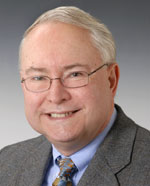

| Home | Who We Are | Articles | Free Consultation |
Saratoga Business Journal, June, 2009
Congress Considering 2009 Patent Reforms
BY PETER MILLER
|
In early March, very similar versions of a “Patent Reform Act of 2009” were introduced in both houses of the U.S. Congress by Representatives John Conyers and Senator Patrick Leahy. The bills call for major reforms, and both appear to build up on the proposed legislation from 2008, which was not enacted. The bills have been moving swiftly through Congress, gathering many arguments of support and opposition. In fact, on April 2, the Senate Judiciary Committee approved the Act (S. 515) by a vote of 15 to 4. This moved the bill onto the Senate floor for debate by the entire body. By the end of April, the House Judiciary Committee had met for nearly three hours to try to complete work on their bill (HR. 1260). This may possibly be the last hearing of testimony in Congress on these reforms. |

Gerald Dudding reviews plans with George Putman, John Bird and David Chapman |
There are a number of key elements in each piece of legislation that could substantially change the way patents are secured and the terms of patent protection. In some cases, these changes would bring the U.S. into conformity with most of the rest of the world; in other cases, new precedents would be established. The details of these bills are quite complex, so the Business Journal spoke with two experts in the field of patent law to help explain their significance.
Gerald Dudding is a Registered Patent Agent with GFD Patents, LLC, whose firm consults with inventors and helps them prepare their ideas for patent submission. He explains one of the more contentious points in 'the legislation - first-to-file vs. first-to-invent: "In nearly every other country, the inventor who files a patent application first has priority over all other claims. In the U.S., our policy grants priority based on when the inventor first thought of the idea. This is also called first-to-conceive, and it is usually based on the first time the idea was written down. It typically relies on entries in lab research notebooks, usually a bound book with consecutively numbered pages, which the inventor must sign daily.
As Dudding explains, the first-to-conceive policy often leads to disputes. "It has given rise to an expensive, time-consuming activity called interference practice, in which companies spend millions of dollars to prove their claims or to disprove others. If two inventors are in different countries, operating under different laws, the courts often give priority to their own citizens. It is not a level playing field, and to reduce the waste and expense of this litigation, other countries would like the U.S. to conform. It looks as if that will happen under this new legislation."
This country allows an inventor a one-year grace period after an idea is conceived and after the invention has been put on sale to file, without losing the benefit of claiming priority to the date of conception. Other countries do not allow a grace period, so commercialization before filing is a absolute bar to patenting in other countries.
Dudding points out, however, that if an inventor offers his or her invention for sale before the patent is filed, he or she loses the right to patent in most other countries that practice so called “strict novelty”. "This is so important," says Dudding, "that every inventor is told about it at our very first interview." GFD Patents offers a free initial consultation with each prospective client. Their clients include a number of entrepreneurs, small start-up companies, and individuals across a broad spectrum of industries.
"Article 1, section 1, clause 8 of the Constitution is the source of patent law, fostering inventiveness and the protection of ideas," said Dudding. "The motivation for patent reform at this time is well intentioned. Congress has been grappling with it for some time. Senator Leahy has made it clear he wants the new law to be fair and to limit some of the ways in which people have been abusing the current law."
Chris Miller is also a Registered Patent Agent who has been following the progress of patent reform legislation. Miller is with Heslin, Rothenberg, Farley and Mesiti, PC, in Albany, Poughkeepsie and Rochester. Miller said, "Patent quality needs to be improved. The ideas in these bills have been kicking around for two or three years."
Miller discussed two distinct perspectives on these reforms: Big Tech and Big Pharma. The patent protection needs of technology companies are different from those of major drug companies and they don’t necessarily agree on the proposed patent legislation. "Some companies, such as Google and IBM, are just looking to run their businesses, not enforcing their patents. But, there are others that seem more interested in 'patent -trolling' to see how much money they can reap from other people's ideas. As a result, big technology companies must spend huge sums on litigation actions to protect their technology."
In the life sciences, drug companies spend billions of dollars developing life-changing medicines, often researching hundreds or thousands before they find the one. "Once they have developed a major new drug, they need strong protection for a reasonable period of time," said Miller. "If the patent laws are weakened, they argue, pharmaceutical R&D will suffer. Pharmaceutical companies are opposed to the current Leahy version of the bill in the Senate, and their lobbyists are working with Senator Jon Kyl to introduce an alternative version that is more favorable to them.'
Some of the proposed reforms are designed to streamline the way the U.S. Patent and Trademark Office (PTO) works and the volume of work it handles. "For example, while a patent application -- with all its claims -- goes abandoned when a patent is issued, the applicant can file a continuation before paying the fee to issue," said Dudding. "This keeps all the original material pending, and when the first patent runs out. the inventor can exercise all aspects of the original application. The new reforms would limit such continuations."
The bills would also reduce the number of claims that could be made for an invention - from 20 to Ilt - before additional fees are required. They would also permit setting patent and trademark fees to reasonably compensate the USPTO for the services it performs. But they would not bar patent fee diversion, a practice by which the federal government has used PTO revenues for of her purposes. It seems that there was strong opposition from the Senate Appropriations Committee on that point.
One contentious point still to he worked out is a means to determine reasonable royalties or damages for patent infringement. It is hoped that a case before the Federal Appeals Court (Lucent Technologies, Inc. v. Gateway, Inc.) will help to "clarify the applicability of damage theories in various contexts,' according to a letter from Senator Arlen Specter to Senator Leahy.
Because Congress has tried to implement patent reform before, without success, Chris Miller said, "It will be big news if it does pass this year."
For more information about patents and patent law, contact Gerald Dudding at 368-4157 (www.gfdpatents.com) or Chris Miller at (585) 288-4832 (www.hrfmlaw.com).
| GFD Patents LLC | |
| Albany Area Office | Buffalo Area Office |
| Registered Patent Agent, | Office Manager, |
| Gerald F. Dudding, J.D., Ph.D. | Mark K. Dudding, B.S. |
| Phone: +1 (518) 368-4157 | Phone: +1 (518) 368-2751 |
| Fax: +1 (518) 218-9292 | Fax: +1 (518) 218-9500 |
| jerry@gfdpatents.com | mark@gfdpatents.com |
| 1764 Route 9, Unit 752 | 1967 Wehrle Drive Ste 3 |
| Halfmoon, NY 12065 | Williamsville, NY 14221 |
| Copyright 2005-2023 by GFD Patents LLC. All Rights Reserved. | Web site designed by Kate Dudding |